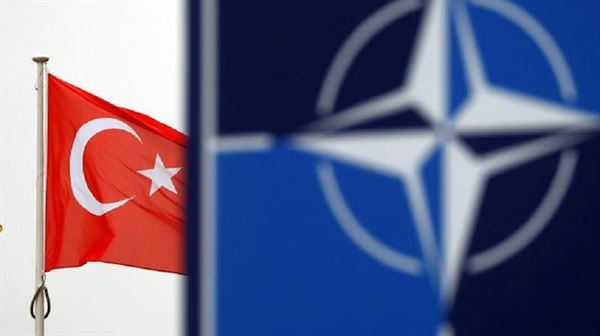As NATO allies gather for a summit in London this week, the key role that Turkey plays in the alliance is again in the spotlight, amid continuing secu
As NATO allies gather for a summit in London this week, the key role that Turkey plays in the alliance is again in the spotlight, amid continuing security concerns in Syria and Turkey’s wider region.
Since becoming a NATO member in 1952 (just three years after its formation), Turkey has been one of the alliance’s biggest contributing partners, making its abilities and capabilities an integral part of the command and force structure of the alliance, with its second-largest army.
The North Atlantic Treaty Organization (NATO), founded on April 4, 1949, currently has 29 members and is headquartered in Brussels.
In 1952, to its 12 founding countries of Belgium, Canada, Denmark, France, Britain, Iceland, Italy, Luxembourg, the Netherlands, Norway, Portugal, and the United States, NATO added Turkey.
This month NATO is marking its 70th anniversary in London with the attendance of heads of state and government.
The oft-cited cornerstone of the alliance is Article 5 of the NATO charter, which ensures collective defense — an attack against one member is an attack against all.
Turkey key partner of alliance
With its mighty military deterrent against terror, Turkey not only makes NATO countries safer but also make it stronger with its capacity, as stated by Western leaders and the alliance’s secretary general.
Speaking last month to French daily Le Figaro, NATO Secretary General Jens Stoltenberg stressed Turkey’s importance.
“Turkey accommodates 3.6 million [Syrian] migrants,” he said, more than any country in the world.
He added: “Turkey is very important for NATO. To understand this, [we] need to look at the map and examine the geostrategic situation in Turkey.”
Just five days later, German Chancellor Angela Merkel highlighted Turkey’s geostrategic importance for NATO and called for greater unity and coordination among the allies.
“Turkey should remain a NATO member, and we should also work to ensure this. Turkey’s membership is of strategic importance for NATO,” she stressed.
However, although most or all Western countries support Turkey’s membership and note its importance in NATO, some leaders have criticized Turkey’s anti-terror operation in northern Syria launched in October.
France’s President Emmanuel Macron recently remarked that Turkey should not expect NATO support in northern Syria.
In widely panned remarks, Macron raised doubts about NATO’s future viability and said he believed the alliance was undergoing “brain death.”
Turkish President Recep Tayyip Erdogan and Foreign Minister Mevlut Cavusoglu both slammed Macron over the controversial remarks.
“Look Mr. Macron, I speak to you from Turkey, but I will tell you again at NATO [the summit]. First, have your own brain death checked,” said Erdogan.
“Macron’s words, in my eyes, have no meaning,” Foreign Minister Mevlut Cavusoglu said, adding that the French leader “constantly hosts” terrorists at the Elysee Palace in Paris.
Turkey on Oct. 9 launched Operation Peace Spring to eliminate YPG/PKK terrorists from northern Syria east of the Euphrates River in order to secure Turkey’s borders, aid in the safe return of Syrian refugees, and ensure Syria’s territorial integrity.
In its more than 30-year terror campaign against Turkey, the PKK — listed as a terrorist organization by Turkey, the U.S. and EU — has been responsible for the deaths of 40,000 people, including women, children, and infants. The YPG is the PKK’s Syrian offshoot.
Turkey’s contributions
Turkey has been the international frontrunner in the fight against terrorism, especially against the terrorist YPG/PKK, Daesh/ISIS and FETO, the group behind the 2016 defeated coup.
The Fetullah Terrorist Organization (FETO) and its U.S.-based leader Fetullah Gulen orchestrated the defeated coup on July 15, 2016, which left 251 people martyred and nearly 2,200 injured.
Turkey also accuses FETO of being behind a long-running campaign to overthrow the state through the infiltration of Turkish institutions, particularly the military, police, and judiciary.
Turkey is also among top five NATO allies giving sustainable support to the alliance mission through 1,100 personnel.
With about €90 million (nearly $100 million), Turkey is among the top eight allies that have contributed the most to NATO funding.
Around 570 Turkish personnel carry out duties under NATO’s mission in Afghanistan.
As part of the Resolute Support Mission in Afghanistan, Turkey is one of the “framework nations,” along with the U.S., Germany and Italy.
Supporting operations under the NATO banner in Iraq, Turkey is the alliance’s second-most contributing member after Canada aiding NATO missions in the country.
With 280 personnel, Turkey is a member of NATO’s Kosovo Force (KFOR) multinational peacekeeping force in the Balkans.
A key partner of the alliance, Turkey hosts a radar base within the NATO Ballistic Missile Defense architecture in the town of Kurecik in its eastern Malatya province.
Turkey also opened its Konya Air Base for the use of NATO AWACS planes.
Turkey plays a leading role in the development of relations between NATO and its partners, especially in the Balkans, Caucasus, and Middle East, and in the implementation of NATO’s open-door policy.
NATO forces in Aegean, Black Sea
Turkey provides permanent naval assistance to NATO missions in the Aegean Sea, presenting surveillance, reconnaissance, and monitoring activities to prevent illegal crossings.
Turkey also supports Standing NATO Maritime Groups’ (SNMG) activities in the Black Sea, which is included as part of NATO obligations.
Moreover, Turkey also hosts LANDCOM, NATO’s land command, in the Aegean coastal province of Izmir.
The NATO Rapid Deployable Corps – one of nine NATO land forces headquarters with high readiness level – is also stationed in Istanbul.
Turkey is also set to take command of the Very High Readiness Joint Task Force (VJTF) in 2021.
